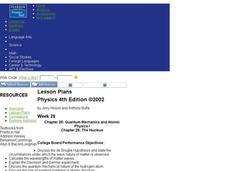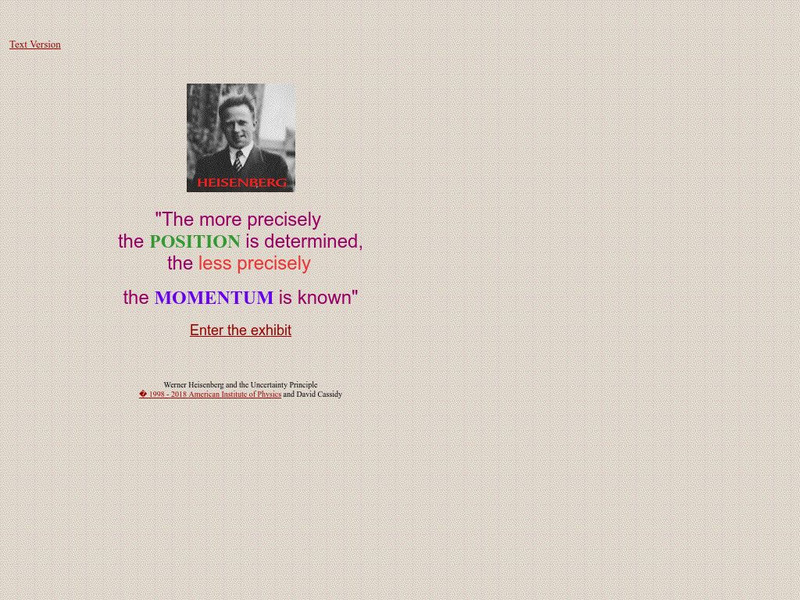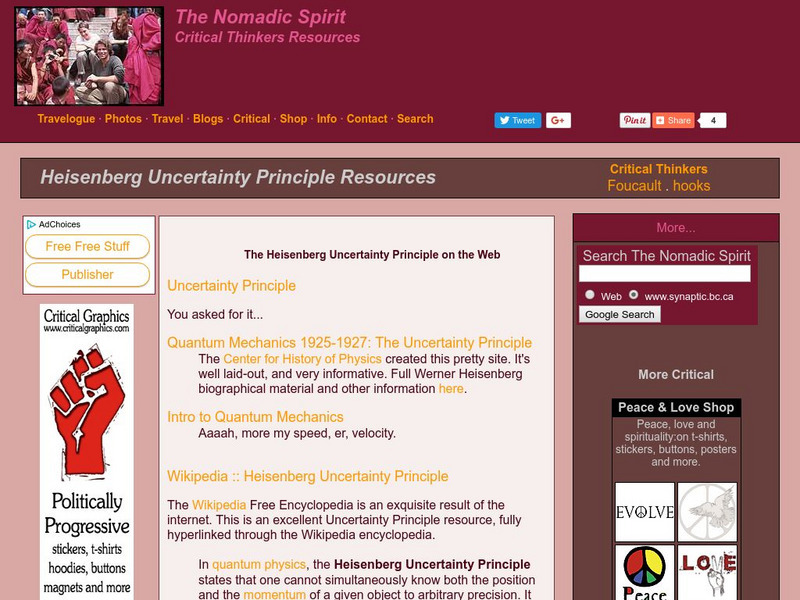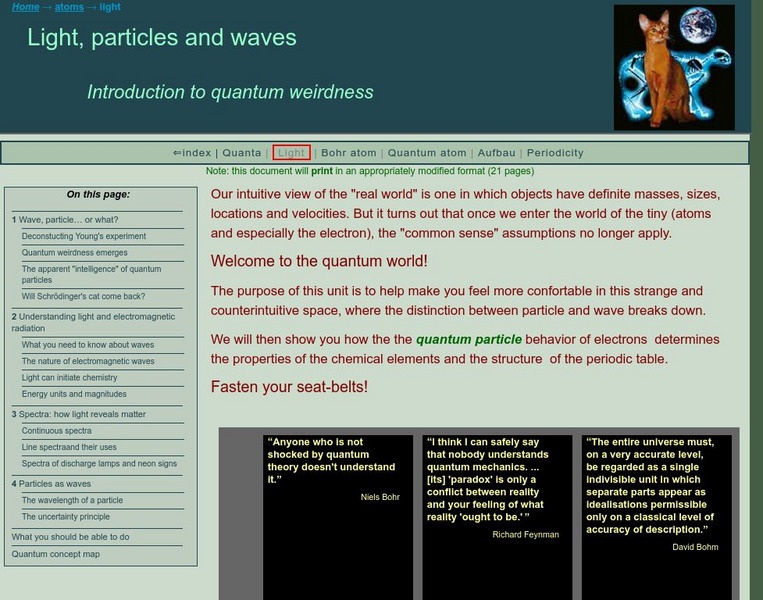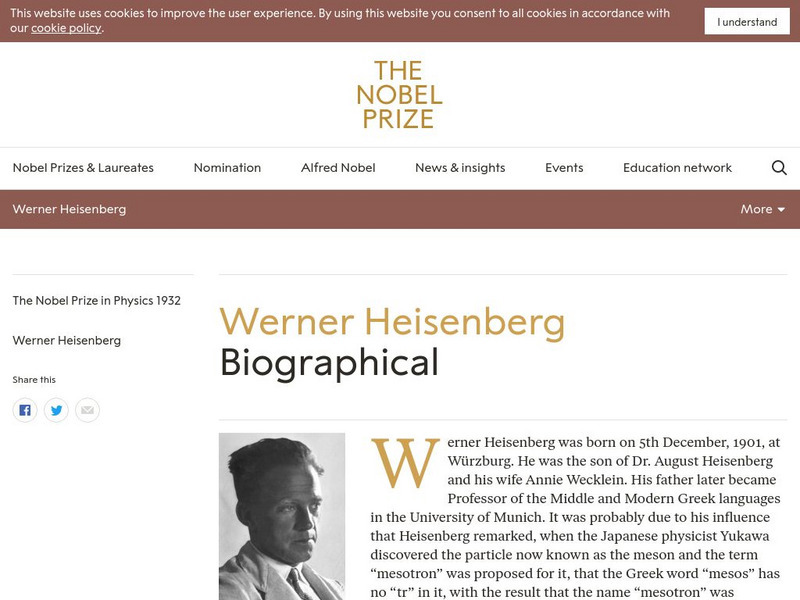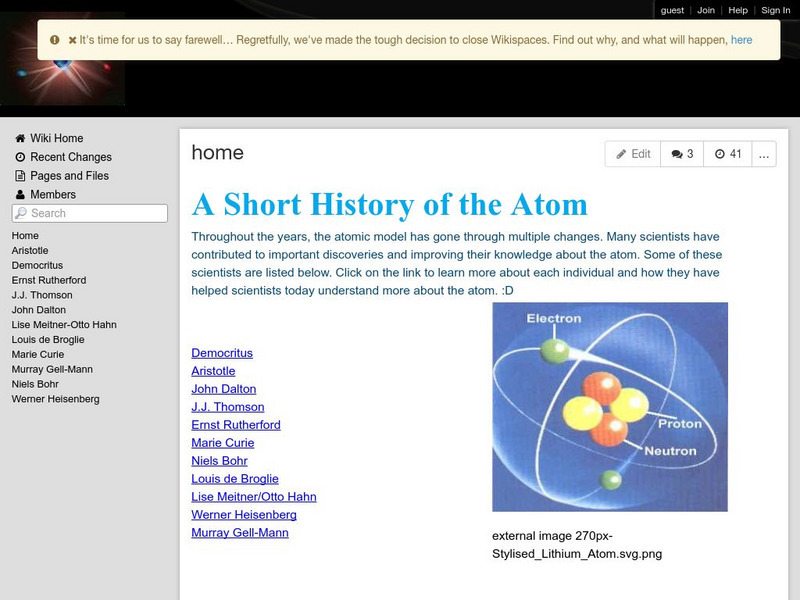Concord Consortium
Structure of an Atom
Feeling a little uncertain about your materials for teaching the quantum mechanical model of the atom? Here is an interactive that will help! Chemistry and physics scholars alike will benefit from a simple resource that illustrates the...
Curated OER
Understanding: Uncertainty
Students discuss the Heisenberg uncertainty principle and how it applies to the subatomic world. Working in groups, they design a model that would help others to understand the uncertainty principle. Written explanations are included...
Concord Consortium
Understanding Probability Maps
What's the likelihood of your class understanding probability maps? Young scientists explore the concept using a virtual dartboard in an interesting simulation. The darts establish a pattern around the bull's-eye, which provides a visual...
National Institute of Open Schooling
Atomic Structure
Learners explain historical findings such as Rutherford and Bohr's contributions, explain wave particle duality, and formulate Heinsenberg's uncertainty principle. They also draw s, p, and d orbitals, explain more historical findings,...
Curated OER
Modern Physics, QM
In this physics worksheet, students examine the theory of quantum mechanics through the answering of the nine questions. The answers are accessed through the links by each question.
Curated OER
Worksheet 25 - Fall 1995
In this math worksheet, students use the theory of quantum mechanics to determine the relative position of objects and how motion could affect them.
Curated OER
Cosmology
In this space science worksheet, students find the words that are related to the study of cosmology and the answers are found at the bottom of the page.
Curated OER
Design Project: Radio Transmitter
For this electrical circuit worksheet, students research the Federal Communication Commission to determine the regulations for a non-license radio transmitter. They will answer a series of another 3 questions to show an understanding of...
Curated OER
Quantum Mechanics and Atomic Physics
Students will discuss the de Brogile Hypothesis and state the circumstances under which the wave nature of matter is observed. They will also calculate the wavelengths of matter waves.
Curated OER
Atomic Structure and Quantum Theory
Pupils are introduced to the structure of an atom and Dalton's atomic theory through a short video and mini-lecture. They also take a look at the weight of mass and become familiar with the idea of quantum theory
Curated OER
Physicists or Philosophers?
Trace the sequential process of the developing theories of atomic structure in the early 20th century, show, in historical development, how scientists "know" things, how experiments are set up and how interpretations are drawn from them,...
TED Talks
Ted: Ted Ed: What Is the Heisenberg Uncertainty Principle?
The Heisenberg Uncertainty Principle states that you can never simultaneously know the exact position and the exact speed of an object. Why not? Because everything in the universe behaves like both a particle and a wave at the same time....
PBS
Science Odyssey: Heisenberg States Uncertainty Principle
Explains the Heisenberg Uncertainty Principle, that it is impossible to know both the momentum and position of an electron, along with describing the impact that it made upon the scientific community upon its introduction in 1927.
Other
American Institute of Physics: Werner Heisenberg and the Uncertainty Principle
This resource is an online exhibit covering Heisenberg's physics, career, personal, and political life.
Other
Heisenberg Uncertainty Principle
Some references to web links regarding Werner Heisenberg, the uncertainty principle and quantum mechanics.
Simon Fraser University
Chem1 Virtual Textbook: The Uncertainty Principle
Acting as a subtopic of the General Chemistry Virtual Textbook's section on Atoms and the Periodic Table, this site discusses the uncertainty principle and its association with Werner Heisenberg.
Science Education Resource Center at Carleton College
Serc: Quantum Physics: An Introduction
Interactive demonstration provides students with an introduction to Quantum Physics. They will also be introduced to wave/particle duality, Heisenburg Uncertainty Principle, superposition, Schrodinger's cat, and wavefunction.
Nobel Media AB
The Nobel Prize: Werner Karl Heisenberg Biographical
This website provides information on the life and scientific contributions of Werner Heisenburg, a recipient of the Nobel Prize in Physics for his "creation of quantum mechanics." Read the Prize Presentation Speech in which Professor H....
Famous Scientists
Famous Scientists: Werner Heisenberg
Find out about German scientist, Werner Heisenberg, a theoretical physicist who was one of the key pioneers of quantum mechanics.
Vision Learning
Visionlearning: Atomic Theory: Wave Particle Duality and the Electron
An explanation of advanced atomic theory based on developed concepts from earlier scientific experimentation.
CK-12 Foundation
Ck 12: The Quantum Mechanical Model
[Free Registration/Login may be required to access all resource tools.] In the following online tutorial students will calculate the wavelength, frequency, and energy of light using Planck's constant and the speed of light. They will...
Khan Academy
Khan Academy: The Quantum Mechanical Model of the Atom
An explanation using quantum mechanics to describe the atom.
Khan Academy
Khan Academy: The Quantum Mechanical Model of the Atom
Introduction to the quantum mechanical model of the atom: Thinking about electrons as probabilistic matter waves using the de Broglie wavelength, the Schrodinger equation, and the Heisenberg uncertainty principle. Electron spin and the...
Other
A Short History of the Atom
A classroom wiki where students present profiles of scientists who developed models of the atom or who contributed to the understanding of atomic theory. Covers Democritus, Aristotle, John Dalton, J.J. Thomson, Ernest Rutherford, Marie...








